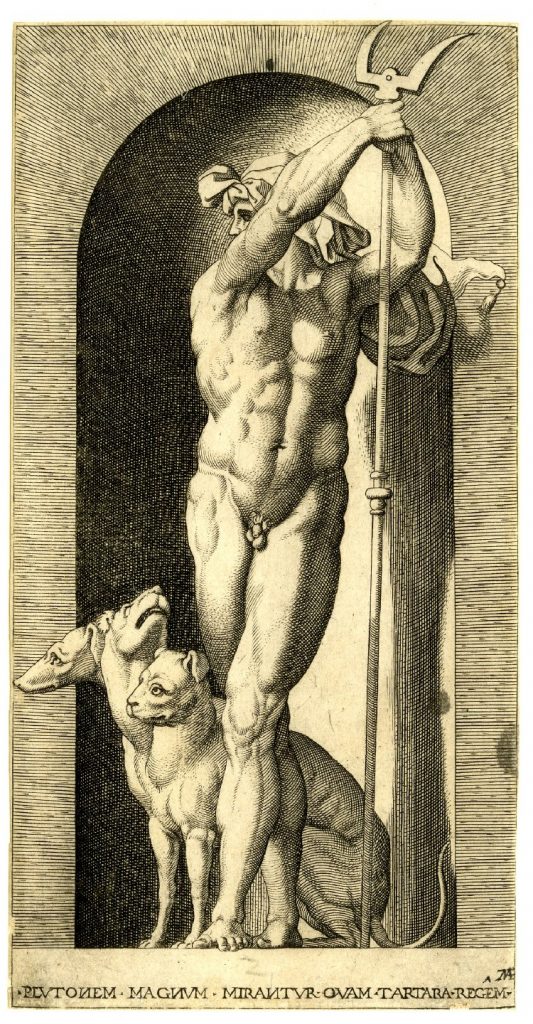More often than not, ancient Greek mythology (religion) served to explain a series of legends. Different from modern religions such as Christianity, Judaism, or Islam, ancient Greek religion was an anthropomorphic polytheism, meaning that ancient Greeks believed in a multitude of individual divine figures that took on human forms and emotions.1 Furthermore, ancient Greek mythology lacked much of the asceticism and mystical enthusiasm that is more commonly seen in modern religions. Most of the highly developed anthropomorphic and comparative rationalism of the ancient Greek religious thought can be accredited to Homer with the aid of his Iliad and Odyssey.2
The people of the ancient Greek civilization were often in a state of weakness under the power of nature; therefore, they relied heavily on the divine individuals of Olympus. Why? They believed that the forces of nature were under the control of their gods. In short, the relationship between humans and divine beings was that of a retribution justice.3 If humans did anything to offend the gods, then those gods would strike back in some sort of fashion to restore justice.4 Therefore, humans were constantly looking to please the gods in fear of their wrath.
Out of the ancient Greek mythology came the god of the dead and the underworld, Hades. Hades had five other siblings: Zeus, Poseidon, Demeter, Hera, and Hestia, and they were all children of Cronus and Rhea.5 After defeating their parents (the Titans), Hades drew lots with Zeus and Poseidon to gain their respective domains. Hades was commonly thought to be a cold god, but he was never considered to be an evil divine figure. Furthermore, it is important to note that his realm, the underworld, should not be associated with the hell of Christianity.6 However, Hades was for the most part feared by all. Another name for the ancient Greek god was Ploutos and later adopted by the Romans as Pluto.7

The god of the underworld was the husband of Persephone (Zeus’s and Demeter’s daughter). Although she was Hades’ wife, she only lived with him during the winter time.8 Persephone was the divine goddess of agriculture and fertility. Therefore, the ancient Greeks accredited the change in nature (winter) to Persephone moving to the underworld. Persephone was unable to stay with Hades at all times due to interference from her mother Demeter. Zeus, however, was okay with the marriage of Hades and Persephone. Therefore, in order to set up the marriage, Zeus had to trick Persephone, so she could be abducted by Hades.9 However, Demeter interfered, and that is why Persephone spends half of the year with Demeter and the other half with Hades.
Furthermore, it is important to note the Greek perspective of the afterlife. Perspectives about the afterlife varied from each other based on their region in Greece as well as their time period in Greek history. The consensus was that the underworld was neither heaven nor hell.10 The sense that exists within Christianity, for example, was not present during the time of the ancient Greeks. Although Tartarus was present as a location within the underworld, the Greeks would not compare it to the equivalent of Christian hell. The way the Greeks saw it, the underworld was a place that everyone ended up after death.11 However, there were a few, including the philosopher Epicurus, that believed that the underworld did not exist at all. He believed that when the body died, the soul died with the body as well.12 A good portion of Greeks refused to believe such a pessimistic perspective of the afterlife. However, even the Greek traditional perspective of the underworld was not as popular despite many Greeks believing in it.
- Funk & Wagnalls New World Encyclopedia, 2016 s.v., “Greek Religion and Mythology.” ↵
- Funk & Wagnalls New World Encyclopedia, 2016 s.v., “Greek Religion and Mythology.” ↵
- Funk & Wagnalls New World Encyclopedia, 2016 s.v., “Greek Religion and Mythology.” ↵
- Funk & Wagnalls New World Encyclopedia, 2016 s.v., “Greek Religion and Mythology.” ↵
- Salem Press Encyclopedia, January, 2015, “Hades (deity),” by Joseph, Michael, DMin. ↵
- Salem Press Encyclopedia, January, 2015, “Hades (deity),” by Joseph, Michael, DMin. ↵
- Salem Press Encyclopedia, January, 2015, “Hades (deity),” by Joseph, Michael, DMin. ↵
- Salem Press Encyclopedia, January, 2015, “Hades (deity),” by Joseph, Michael, DMin. ↵
- Salem Press Encyclopedia, January, 2015, “Hades (deity),” by Joseph, Michael, DMin. ↵
- The Greenhaven Encyclopedia of Ancient Greece, 2007, s.v. “Underworld,” by Robert B. Kebric. ↵
- The Greenhaven Encyclopedia of Ancient Greece, 2007, s.v. “Underworld,” by Robert B. Kebric. ↵
- The Greenhaven Encyclopedia of Ancient Greece, 2007, s.v. “Underworld,” by Robert B. Kebric. ↵



186 comments
Camille Kwan
This article reminds me of Percy Jackson and the olympians. I thought it was cool how you perceived hades as only the god of the underworld and dead and not as the enemy. That is how the greeks saw him, as you pointed out, not as a monster who killed anyone he wanted to. Your article left me wanting more, kind of like a cliff hanger. It pushed me to want to look more into the God of the dead and the different aspects of the underworld and how the compare to catholic beliefs.
Tavion Varela
The background information on Greek mythology is helpful in understanding how it actually worked. They operated more out of fear than respect because the gods were controlling the “forces of nature”. The god of the underworld, Hades, is a rather divine figure. Prior to reading this article, I had paired the Greek mythology underworld to the hell of Christianity which is a bad association.
Nadia Manitzas
Having a prior knowledge of Hades and the Greek mythology, this article describes in great detail the polytheistic beliefs and the affects it had on the peoples lives. It’s so interesting that during this time they believed that their lives were based on multiple God’s and to have a happy life, you must please the Gods and Goddesses. The story of Hades is very interesting because it’s a love story that is very much confusing. Persephone (The Queen of the Underworld) was taken against her will by Hades but Demeter allowed her to live her life in both worlds. In Greek mythology, they believe that everyone ends up in hell but other Scholars tried to say that’s not necessarily true but the Greeks couldn’t believe them.
Meadow Arriaga
I admire how this article gives background of polytheistic beliefs, and why the Greek worked in multiple Gods’ favors. The respect they had was somewhat out of fear. The views of the afterlife are specific and in my opinion, very different from other religions. In greek mythology, a belief is that the soul and body are separate from one another.
Amelia Hew
The story of Hades and Persephone was one of the most well-known Greek mythology. Despite the fact that Persephone was kidnapped by Hades against her will, she eventually grew accustomed to her new role as the Queen of the Underworld. However, thanks to Demeter she had to spend half of the year with her mother and the other half in the underworld. Also the underworld was not associated with the Christian Hell. It is a place to judge the souls that made it across the River of Styx and Acheron guided by the ferryman, Charon. Tartarus was the place equivalent to Hell while the Elysium Fields was similar with Heaven.
Patricia Arechiga
I have always been fascinated by Greek mythology, but have never really taken the time to read and overall look deeper into it. I find it pretty interesting how the Greeks truly connected their Gods with the overall condition of their circumstances. If conditions were rough, it was believed that the Gods were upset. Everything nowadays somehow ties back to the mythology the Greeks sustained.
Jesus Parker
I never was well versed in Greek mythology but I always knew how deep it can get and how intricate it is. Hades along with Zeus is well known among everyone whether it is because of school or media. Hades is basically the ruler of the underworld akin to the Devil in Christianity. Interesting how he has his own back story and everything because it could have been easy to say he was the ruler of the underworld.
Felipe Macias
Great point to distinctly differentiate the Christian hell and the Hades Underworld. Often associated to be alike, the both are dissimilar, though media and books describe both environments as dark and haste wastelands. Hades was the god of the underworld and riches, not the Devil or a mere demon. He had influence on realms outside of his lair and even managed to get married (forcefully but we don’t talk about that).
Mauro Bustamante
the aspect on how you pointed out the differences between Greek beliefs and Christian beliefs. Religion varies and people shouldn’t compare two different ones together, even if they are similar in certain aspects. Even more interesting, the Greeks would use the coming of winter as a sign that Persephone had returned to the underworld. The most eye-opening part of this article was the clearing of the concept of the underworld. this article was interesting and informative and well written.
Stephanie Cerda
The first time I was introduced to Greek mythology was through the well known book series, Percy Jackson. It’s interesting to see how books will lead to more people knowing certain versions of the story, and how as time passes, different versions grow. I liked how you pointed out the differences between Greek beliefs and Christian beliefs. Religion varies and people shouldn’t compare two different ones together, even if they are similar in certain aspects. One thing most religion have in common is how they all try to explain the afterlife, and at times, life in general is based on what they think will happen in the afterlife or after death.